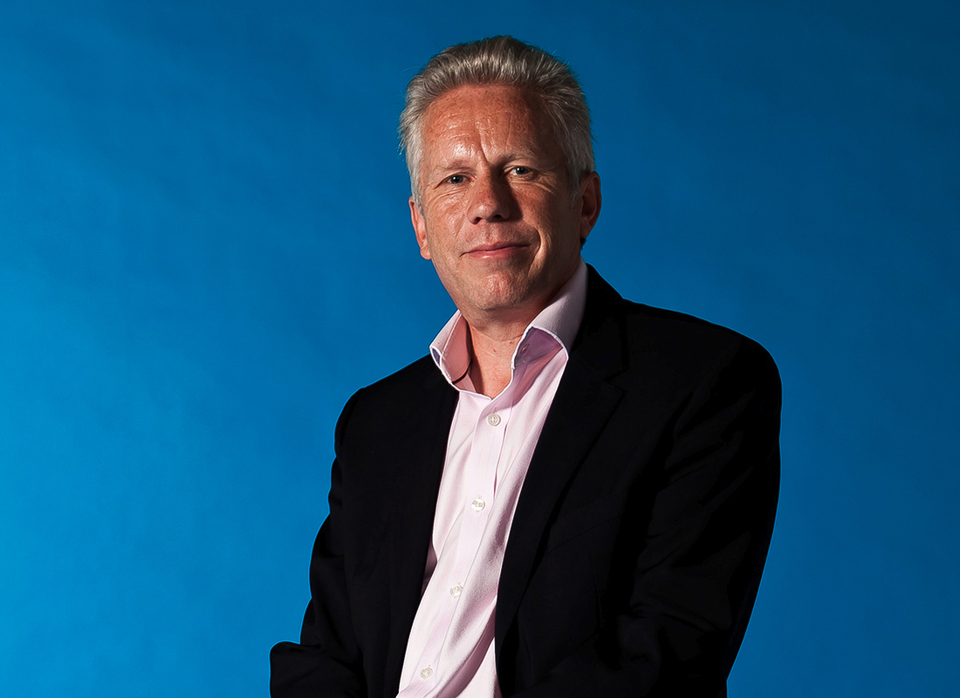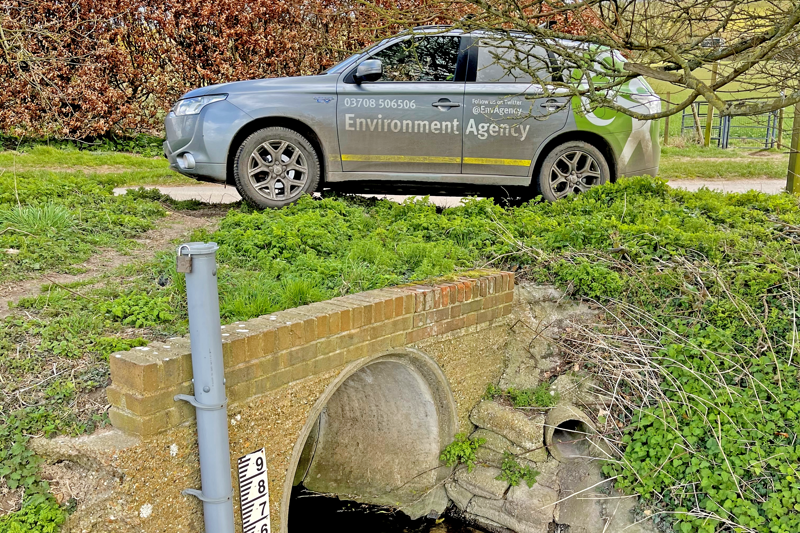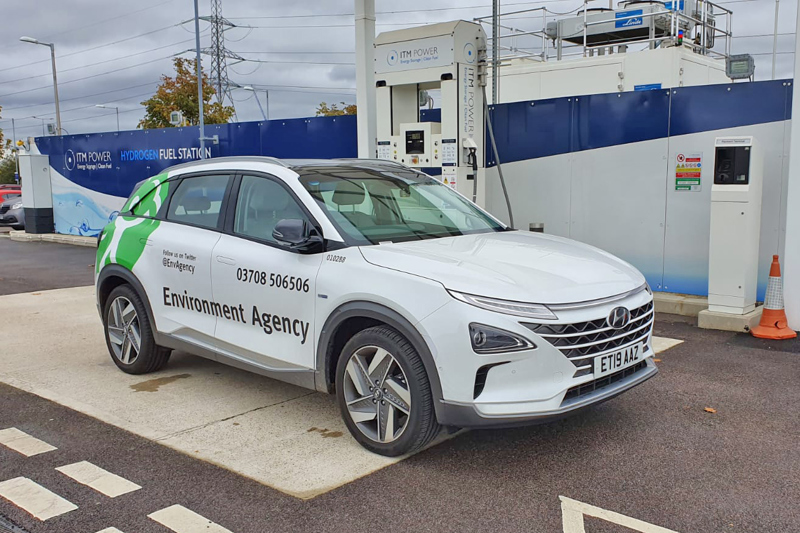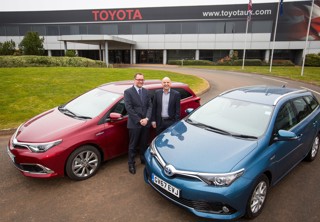Two years ago, Dale Eynon (left) presented a new strategy to the Department for Environment, Food and Rural Affairs (Defra) executive directors team setting out an ambitious blueprint to achieve a 45% reduction in carbon emissions by 2030 across the fleet of vehicles, boats and plant. Set against a 2020 baseline, the plan includes transitioning to a zero-emission vehicle fleet by 2027.
The strategy has been written to dovetail with Defra’s target of net carbon zero for the Environment Agency, its biggest public body, by 2030.
That was in February 2020; a month later, the country went into Covid lockdown and the strategy was shelved as emergency measures and a completely new way of working changed the profile of the business.
It has taken until this year for group fleet services director Eynon to dust off the documents and rework the timelines. The 2030 deadline remains; it’s just the speed of change that has been revised. Instead of a decade of transition, Defra now has less than eight years to achieve its target.
Eynon is unfazed by the shortened schedule. He had already made substantial progress during 17 years at Environment Agency, which makes up the bulk of the Defra fleet.
Phase one will “transform how we manage our lease cars”, he says. “We recognised that our business has been changing and part of the money we get from Government in grants and aid has been reduced for certain activities, such as lower-level pollutions, inspections and monitoring. We had to reflect that in our car use to show that we continue to provide good value for money, and we are managing our business correctly.”
Since March 2020, the car fleet has decreased from around 4,000 to 3,350. By 2030, the target is 2,000.
Two years ago, Dale Eynon (left) presented a new strategy to the Department for Environment, Food and Rural Affairs (Defra) executive directors team setting out an ambitious blueprint to achieve a 45% reduction in carbon emissions by 2030 across the fleet of vehicles, boats and plant. Set against a 2020 baseline, the plan includes transitioning to a zero-emission vehicle fleet by 2027.
The strategy has been written to dovetail with Defra’s target of net carbon zero for the Environment Agency, its biggest public body, by 2030.
That was in February 2020; a month later, the country went into Covid lockdown and the strategy was shelved as emergency measures and a completely new way of working changed the profile of the business.
It has taken until this year for group fleet services director Eynon to dust off the documents and rework the timelines. The 2030 deadline remains; it’s just the speed of change that has been revised. Instead of a decade of transition, Defra now has less than eight years to achieve its target.
Eynon is unfazed by the shortened schedule. He had already made substantial progress during 17 years at Environment Agency, which makes up the bulk of the Defra fleet.
Phase one will “transform how we manage our lease cars”, he says. “We recognised that our business has been changing and part of the money we get from Government in grants and aid has been reduced for certain activities, such as lower-level pollutions, inspections and monitoring. We had to reflect that in our car use to show that we continue to provide good value for money, and we are managing our business correctly.”
Halving the car fleet
Since March 2020, the car fleet has decreased from around 4,000 to 3,350. By 2030, the target is 2,000.
To implement the necessary transformation, the agency underwent a fleet restructure which saw all the funding for leased cars centralised with Eynon’s team and the costs moved to his budget – previously it was split across the whole organisation. He says:
“The process for allocating leased cars now sits with me as well, which gives us better control of budget and accountability.”
The new fleet policy was launched with Environment Agency in April, a year later than intended, and will now roll out across other Defra bodies. It marks the first all-new fleet policy since 2012.
Among the fundamental changes is a move away from a mileage-based company car policy towards a two-tier approach based on frequency of use – how often people need a car to do their role – and operational response times, typically within four working hours for incident response.
The minimum frequency requirement is two working days per week based on a cost matrix of car hire: it is cheaper to hire a car for anything less than two days.
It is intended to add clarity on eligibility and to eliminate excess mileage by staff trying to justify their entitlement. All non-qualifying staff go into the Defra travel hierarchy, although former company car drivers were given the option of buying their old lease car.
MaaS pilot
The number of pool cars at area offices and depots has also been increased, while Defra will start a Mobility as a Service (MaaS) pilot project in September.
All Defra cars are job-need; nevertheless, slashing the car fleet in half has significant implications for staff who pay a contribution to have private use.
The fleet team consulted widely with employees, HR, trade unions, executive directors and network groups to ensure the move is as painless as possible, but Eynon concedes the new qualifying criteria has resulted in a lot of push back from those now not eligible. He says:
“It has been the most controversial thing I’ve had to manage in fleet, not least with the timing in a pandemic.”
“We kept giving a consistent message from the chief executive down. We introduced a SharePoint site with FAQs, and we posted the new policy five months before it went live, to give that clarity. We also gave line managers briefings and information packs to explain why we were making the changes, the process and what happened if you were no longer eligible.”
So far, 450 cars have been returned, with another 500 due over the coming year or so. Eynon expects to get to the 2,000 by 2025/26, four years ahead of target.
“We are going through an 18-month programme of reviewing all drivers and applying the new policy,” he adds. “Where drivers are no longer eligible, they are given six months’ notice.”
He has already saved around £1.2 million in lease costs over the past 12 months; in total, the fleet reduction is estimated to save £3m-£4m a year.
Restricted choice list
The other big change introduced in the new policy was to restrict the car choice list to ultra-low emission models only, typically full electric or plug-in hybrid. Eynon rejected a suggestion to jump straight to EV-only due to the current supply shortages.
“But we will go full EV by 2023 for all our cars and light commercial vehicles (LCVs) so all those vehicles will be zero emission by 2027 – that’s our commitment,” he says.
Currently, 22% of the Defra car fleet is ultra-low emission vehicles (ULEVs), with almost 400 of those full electric; the first staging post is to hit 25% by the end of the year. Eynon says:
“We will smash that target. Our average CO2 emissions on cars is already down to 78.7g/km.”
The EV transition, aided by the new IRFS 16 (International Financial Reporting Standard) lease accounting rules, have encouraged Defra to trial alternative funding options for vans, with leasing now a consideration. It has dabbled “on and off” in the past but has now ordered 100 small electric vans on a three-year contract purchase with Novuna.
“The idea is to see where the market is in three years’ time and, if nothing better has come along, we will either use our capital to buy them off Novuna or extend the lease for a bit longer,” Eynon says.
“With the changes to IRFS 16, everything is capitalised so we can now use our capital for leases which we couldn’t before.”
Set of priorities
Defra doesn’t just operate a robust travel hierarchy, prioritising digital meetings and public transport over car share, car hire and company cars, it also has a workplace charging hierarchy for electric vehicles (EVs).
Light commercial vehicles take precedence, then pool cars, followed by operational leased company cars and, finally, office commuters.
It already has 200 charge points across the country and is now embarking on a £3m investment project to install another 100-150 chargers, working with Mitie. The existing network is mainly 7kW; the new units will be a mix of 7kW and 50kW with solar panels and battery storage.
Many sites are in rural locations where there are gaping holes in the public charging infrastructure. Eynon says:
“We are trying to future-proof our network, but we also want to provide options for the public which will require back office functionality.”
Most vans are depot-based but some return to home if the driver is on standby.
With cars, Defra offers two charging options for staff: either the leasing company provides the charger with the driver repaying the cost over the four-year lease contract or they can sort out their own charger; Defra doesn’t contribute anything. Uptake is split 50-50 between the two options.
Home charging
The more challenging issue is to find a solution for staff without the capability to have a home charger. Eynon is working with the Association of Fleet Professionals on its kerbside charging initiative and has also signed up to Just Park which enables staff to co-charge their car with other people who live nearby.
Eynon is also pressing manufacturers to bring an electric pick-up truck to market; it’s a gap in the model portfolio that fleets like his are desperate to see filled. The other void is for vans that can tow.
“Our 4x4 fleet tows a lot and we’re struggling to get ICE (internal combustion engine) models with that capability let alone electric,” he says.
“Weight on the tow bar is the issue because an ICE has the engine at the front which counters it, but when you’ve got batteries that are flat across the bed, there is a danger of lifting the truck’s front end. The design is challenging.
“We’re trying to work across central government, with Ministry of Defence, and talking to National Highways, to get volumes together so we can interest a manufacturer to bring forward their development plans. As a wider government, we could pre-order thousands.”
It’s just one of a number of challenges regularly coming across the desk of the former Fleet News fleet manager of the year – others include disappearing discounts and lack of supply – but they will not deflect from his main goal of becoming a net-zero fleet.

Dale Eynon on.... MaaS
Mobility as a Service (MaaS) has taken on near mythical qualities: a holistic travel solution that few businesses have managed to grasp.
Dale Eynon’s vision is to replace commuting, business travel and private use of a company car with a package tailored to the individual that they pay for on demand or via monthly subscription.
He started scoping out the concept with Enterprise, FleetOnDemand and Liftshare 18 months ago, but the plans were put on hold by Covid. However, he is now in the final stages of signing off a trial which is scheduled to start in September for 12 months across three sites, including Bristol, and involving 1,500 staff.
The service will be app-based where staff put in details of their journey and are given options based on cost, carbon and time. Mobility options include car share, hire, public transport, pool cars (including for weekend and evening personal use) and taxis with the potential to include e-scooters when they become legal outside of the pilot trials.
“It feels like a slick integrated system although we are struggling to load train and hotel information at the moment because they are on different systems,” Eynon says. “We want people to make sensible decisions.”
Billing will be separated for business needs and personal usage and there will be restrictions on choice: for example, longer distances will preference train over car options.
“We will manage and refine these as the trial goes on,” Eynon adds.
“We want to se what the system can deliver and where the limitations are. We also want to incorporate leasing, but we are probably two-to-three years off from that. But we hope to share our findings across Government and the private sector.”
The system will report on key performance indicators (KPIs) including carbon and cost as well as operational efficiency for the business.
Eynon says: “It might only work in urban areas and not rural, so we are picking one of our rural depots to compare.”
Longer-term, he has aspirations to move the entire fleet across to a usership model, not ownership where the priority is shared assets across Defra.
Within Environment Agency, plant is already shared across each area which has saved around £500,000. Vans are the next challenge. “As we transform the LCV fleet, that sharing agenda will be much stronger,” Eynon says.
Login to continue reading.
This article is premium content. To view, please register for free or sign in to read it.
























Login to comment
Comments
No comments have been made yet.